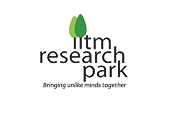Bringing unlike minds together’, true to its tag line, the IIT-M Research Park in Chennai serves as a meeting ground for faculty, students and industry from all over the world. Built at a cost of `450 crores, the facility with a built-up area of 1.2 million sq ft currently hosts around 30 to 40 companies and is expected to house 150 companies in the next five years.
IITMRP has been operational for four years now and has nurtured entrepreneurial spirit in its students. It invites leading companies to establish their research centres here, their USP being proximity to the IIT campus, state-of-the-art labs and expertise of the IIT-M faculty.
It also houses many startups and incubators, the IIT-M bio incubator being the latest addition. For students with no fancy resources to get their project off the ground, IIT-M provides a favourable ecosystem. Out of 550 faculty members, at least one-fourth of them, around 50-60 are involved in the research park, says Prof Ashok Jhunjhunwala,
Department of Electrical Engineering, who heads the IIT-M Incubation Cell and has been one of the main academicians behind the conception of the research park.
While, their clientele include national level defence and heavy engineering institutes, multinational fortune 50 companies also vie for space in the campus. IIT-Madras Research Park has a proprietary CREDIT system to measure the extent of collaboration between a company and IIT Madras. CREDIT is an acronym for Collaboration in Research and Engagement with Departments in IIT Madras. Hence, each company has to earn a certain minimum number of credits each year depending on the space occupied.
One can approach IITMRP by submitting a research proposal. After approval of the proposal by the screening committee and feasibility check on tenant’s structural requirements for its facilities at the research park is done, the leave and licence agreement is signed before the handover.
Customers of the research park can opt for long-term lease of premises for 20 years, or a short-term lease for three years. The leave-and-licence-fee modules operate differently for the two. Besides this, they are also expected to earn credits by active involvement with IIT-M.
For short-term lease, a security deposit of 10 months needs to be paid, 50 per cent of which is paid as advance and the rest during handover. There are two categories. One that costs `42 per sqft per month and the second that costs `50 per sqft per month.
Research centres at the park include Rural Technology and Business Incubator (RTBI), Telecom Centre of Excellence, The Centre of Excellence in Wireless Technology, Healthcare Technology Innovation Centre (HTIC), Centre for Technology and Policy and Bio Incubator. All these incubators come under IIT-M’s incubation cell.
The RTBI facilitates, designs and incubates businesses with a rural bent. Their focus areas include education, health, agriculture, financial inclusion, micro-enterprise development and technology solutions for rural needs.
HTIC brings together technologists, engineers, doctors and healthcare professionals to develop economically viable healthcare technologies. HTIC collaborates with leading medical institutions in ophthalmology, ultrasonography, orthopaedics, neonatal care and patient monitoring and develops affordable healthcare products for them.
“ARTSENS (Arterial Stiffness Evaluation for Non-invasive Screening) developed by HTIC under the guidance of Prof Mohanasankar Sivaprakasam, Head of HTIC, measures a patient’s propensity for heart attacks. It costs less than `1 lakh and measures the stiffness of blood vessels in seconds. Conventionally, the test is extremely expensive,” says GP Shekar, Vice-President, Industry Academia Interface, IITMRP.
They have also developed mobile cataract surgical units with Sankara Nethralaya, Bangalore, he says. The unit consists of two vehicles — a patient-preparation vehicle and a surgical vehicle. “In rural areas, the screening is done in minutes and within the next hour, patients are in the sterilised surgical chamber. Picture this process in a conventional hospital set-up, it is so difficult and time-consuming for people,” he says.
He explains that when students come up with ideas, if it generates sufficient interest in the faculty members, they go on to get their seed grants, and with a few thousand rupees and an office space at a subsidised rate, they get going. “The students get three years to decide if they want to stay or leave,” he points out.
Research and development clients of IITMRP include BHEL, Tata, CII, Titan, Cognizant, Caterpillar and Nissan. “We have a success rate of 50-60 per cent. Kris Gopalakrishnan (Executive Vice-Chairman of Infosys) had once said 10 per cent success is considered extremely high. Ather Energy, which was incubated here developed an electric scooter from scratch. They built everything, right from the chassis to the motor. It has an Android dashboard that helps in navigation. Smriti Irani, Union Minister for Human Resources Development, rode the bike too!” he exclaims.
Lakshmi Vaideeswaran is the CEO of Gyan Data Pvt Ltd, a three-year-old startup that is into data analytics at IITMRP. She says IITMRP is unlike other research parks in the country. “It is one of a kind because here the idea is not to generate business. There is a high-level of skills and expertise, and idea exchange here. Another thing is the diversity. It is not about any one area of research or one company. IITMRP provides an ecosystem for everyone,” she says.
“We should be able to break even in 2015. We receive `10 crore in alumni grants, and we’ve taken loans from the HRD ministry on interest and are expecting a `100 crore corpus from the Central government. We have developed everything from wireless technologies, rural ATMs, solar DCs, agricultural services and healthcare. The purpose is to provide engineering solutions that are both affordable and accessible,” says Jhunjhunwala optimistically.


